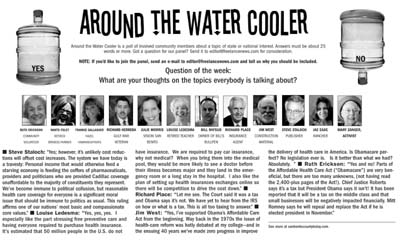Ruth Erickson: “All low-paying jobs need to pay more; however, unions are encouraging this and want workers to join them. How much of their higher pay would go toward union dues and how many people may be laid of due to the restaurant owners having to pay higher wages? Don’t wish for something you may regret! Weigh all the options!”
Jim West: “No. Hey, everybody ‘deserves’ higher pay but that’s not the way our economy works. Fast-food jobs are starter jobs, entry level jobs, jobs to teach people how to work and give you the skills you need to move on. Unless your career goal is McDonald’s upper management – and I know of people who started out flipping burgers and ended up owning a string of fast-food franchises – fast-food jobs are not designed to be life-time jobs and if entry-level employees got paid what they ‘deserved’ the economic model would crumble.”
Mary Zanger: “Yes. Currently fast food workers punch a clock for an eight-hour shift and earn enough to maintain themselves in perpetual hopeless poverty. It is not right for a society to allow anyone providing an honest day’s work to earn less than an honest day’s pay. A society that allows this injustice seems overwhelmingly negligent and immoral. A working person needs to earn a wage such that they have enough to eat, pay rent and have educational and growth opportunities known as quality of life. Multiple studies reveal that when the minimum wage is raised more jobs are produced while also stimulating the economy!”
Marty Richman: “Full-time employees with longevity deserve higher pay, part-time short-lived employees do not. Fast-food workers are at a major economic disadvantage because they do not get tips even though the service they provide is semi-personal. Full-time workers with longevity are retained because they are reliable and good at what they do and are therefore worth much more to an employer. Part-time, short-lived employees are often high school kids earning spending money or those just bridging between regular jobs.”










